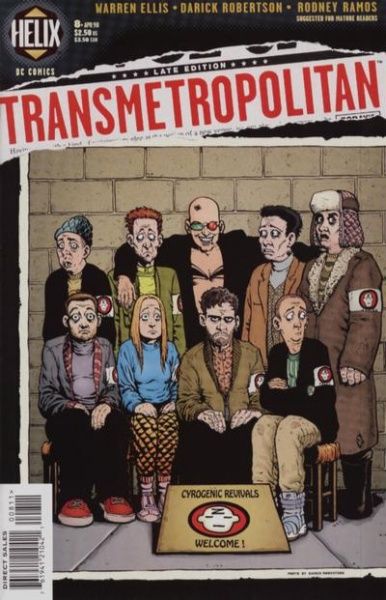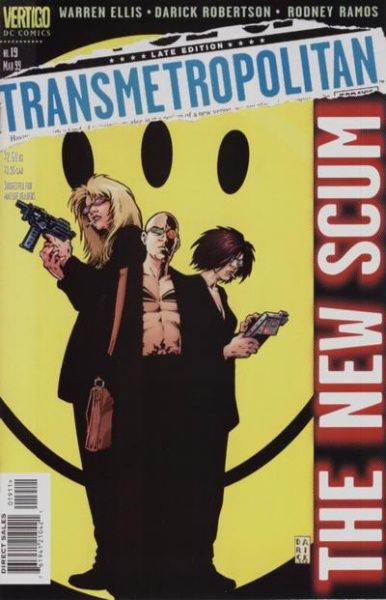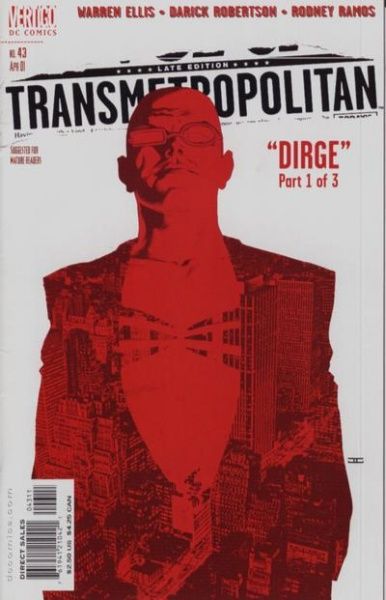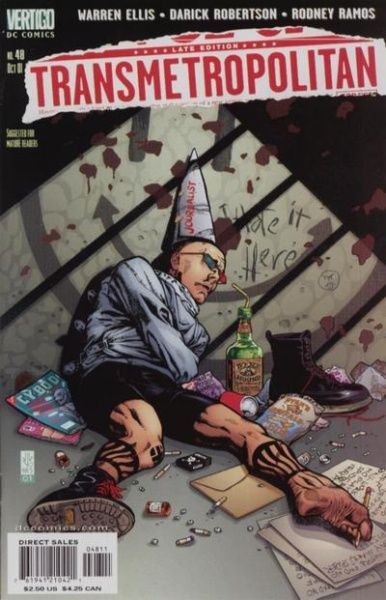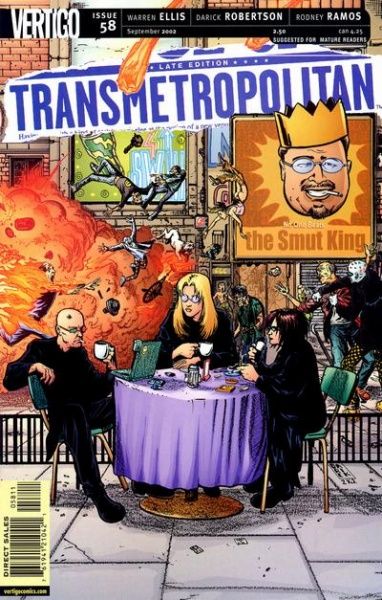Today:A Warren Ellis comic starring a real bastard andsome tough-as-nails chicks. What do you mean, that's not specific enough?
27/11/07
331.Transmetropolitan
"Transmetropolitan" is the first track on the first Pogues album, Red Roses for Me. Penned by a precocious Warren Ellis just after his 16th birthday, it's a rollicking Irish tune about young punks roving all over London, and includes lyrics that reflect Ellis's future worldview, such as: "And we'll go where the spirits take us, to heaven or to hell, and kick up bloody murder in the town we love so well," "And when we've done those bastards up we'll storm the BBC," and "This town has done us dirty, this town has bled us dry; We've been here for a long time and we'll be here 'til we die." The song reflects the cynicism of much of Ellis's later work, but he soon realized his future wasn't in songwriting, but in ...
Hang on. A Mr. Bill Reed has just explained to me that Transmetropolitan actually refers to Mr. Ellis's 1997-2002 comic book, and it is a Reason to Love Comics. Whoops. Please forgive me. How could I have confused a comic about a sprawling city in which horrible things happen as a roving bastard navigates his way through it with a song of the same name about a sprawling city in which horrible things happen as roving bastards navigate their way through it? Such a silly mistake!
Anyway, Transmetropolitan (which was originally published under DC's Helix imprint but switched to Vertigo whenthe formerwent belly-up; this is the only thing I ever read from Helix,but I was always interested in that Christopher Hinz/TommyLeeEdwards mini-series, because Hinz'sParatwa books are pretty darned cool)is probably Warren Ellis's masterpiece, because in it he distills pretty much all his common themes into something that transcends those very same themes, keeping it from being just another jeremiad bya writerwho acts like a grumpy old man in print quite a bit even though he's younger than my wife (which I just found out; either he looks old or she looks young). Too often Ellis allows his polemics to override the story, and in the early issues of Transmetropolitan, it seemed he might do that. Then something happened. The book became less of a bitch-fest and more of an exploration of the future, something Ellis is obsessed with but which he does here with far more heart than he does in other books. By looking at the future as a strange yet wonderful place, Ellis made his protagonist/alter ego, Spider Jerusalem, less of a prick and more of a sympathetic figure, as he wound his way through a brave new world. By having Spider drop out of society before the book begins and by making the comic about him coming back into that society, we see the weirdness with a less jaundiced eye. Even though Spider is able to adapt easily to life in The City (which is the only place that matters in the comic), he does have to re-learn some things. This enables us to experience things as he does, and it makes it more wondrous than if all the characters are already jaded about it. Whether it's people being revived from suspended animation, cultural reservations where the past is preserved to the extent that once you enter them, you're not allowed to leave, or people converting themselves into "foglets" of nanomachines, Ellis makes them new. They also tie into a theme of the book, that of people losing their humanity and, more importantly, the bonds between them. Spider, ironically, becomes more attached to his humanity throughout the book, and it's why, despite him being a fairly typical Warren Ellis creation, he remains a great creation.
Going along with Spider are his two assistants, Yelena Rossini and Channon Yarrow, who are crucial to his journey to non-bastardness. The few quiet moments he spends with one or both of them are what make the book beautiful and memorable, as when Channon's boyfriend decides to transfer his soul into nanomachines, and the panels in which Spider attempts to comfort her are both wonderful, because it shows how much he cares for her, and painful, because he's not very good at it,to watch. In many of Ellis's works, the ideas overwhelm us, and it's not too much of a surprise that his best recent stuff (this, Fell, and Planetary) have more than just weird futuristic memes at their core. When he wants to, Ellis fits the future into a grounded story, and without it, we simply wouldn't care about Spider all that much. Of course, the story is also a place where Ellis can spout off about various things that piss him off, and Spider is often very grumpy and vile, but this just allows him to go toe-to-toe with two presidents and come out on top. Transmetropolitan earns the excellent payoffs to the story arcs because of the good work Ellis does with the characters.
As forwhat Ellis is trying to achieve with this, awhile back I wrote this about the series:"When we sit and read all sixty issues in a relatively short time, the minor setbacks become simply inconveniences, and we are allowed to watch The City sprawl before us and really take it all in, which almost overwhelms us. That's the point - The City should overwhelm us, because it overwhelms everyone, Spider included. He is there to guide us home, just like Ellis wants to guide us home. The metaphor is never forced, but The City is our world, and the implication is that we need a guide who will show us the path and then kick us in the ass. The fact that we keep returning to that guide - whether it's our parents, government, or God - is what Ellis is trying to wean us from. But he's as culpable as we are, because whenever Spider wants to quit, he is drawn back in - through his own sense of righteousness. He continually needs to save the citizens of the City from themselves. It's a complicated idea to put forward, and Ellis might reject it, but Spider can only gain freedom when he realizes that he can't force others to follow him. He claims he wants the citizens to think for themselves, but whenever they do, he gets angry because they're not making the "right" decisions. Do we sense Ellis behind all of this, telling us to make our own decisions but then ranting when we don't do what he thinks is right?" I have no idea if that's what Ellis was thinking, but it seems that from a lot of his other printed work, he does feel this way, and that's what makes Transmetropolitan such a challenging work. Spider is a very complex character, and it's fascinating to watch his transformation.
You know, I should mention Darick Robertson's excellent art. He pencilled all 60 issues, with occasional pin-ups and short sections by other famous and/or great artists. But I've probably gone on too long, so you'll just have to check a trade out of the liberry to gaze at the nice art.
The entire series has been collected in trade, and should be easy to find. Someday way in the future I'll have to delve into this even more as a Comic You Should Own, but for now, it's just a Reason to Love Them. (The covers, of course, are courtesy of the Grand Comics Database. All hail them!)
(Mr. Bill Reed asked me to pinch-hit forhim tonight. He'll be backmanaña with some other Ellis goodness, I imagine.)



